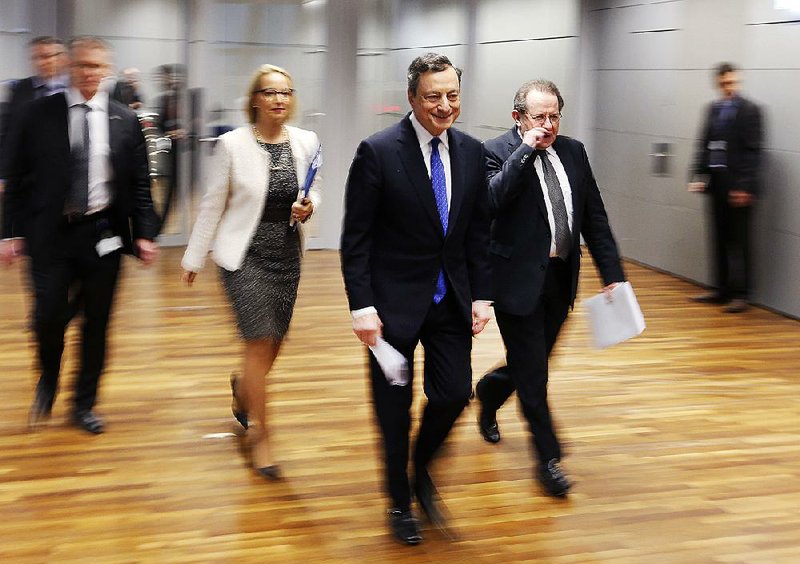FRANKFURT, Germany -- The European Central Bank said Thursday that it will pour $579 billion in newly printed money into the eurozone economy to support its recovery as the currency union heads into what could be a tumultuous election year.
The bank's 25-member governing council extended the duration of its bond-buying stimulus program by at least nine months, from March until December next year.
But the council startled markets by reducing the monthly amount of bonds it will buy after March to $64 billion from $85 billion currently.
European Central Bank President Mario Draghi said the reduction did not mean the bank was tapering, or phasing out, the stimulus.
He said there was "no question of tapering" and that such a phaseout of the program was not even discussed at the meeting.
Draghi said the central bank could increase the monthly purchases if needed and that there is still no firm end date for the stimulus program. He noted, however, that the economy could get by with less monthly stimulus now because the danger of deflation -- falling prices that kill off growth and investment -- had passed.
The bond purchases pump freshly created money into the banking system in hopes of increasing weak inflation and encouraging growth. The flood of cash also helps keep financial markets calmer as Europe faces elections in the Netherlands and France next year, where anti-EU, populist candidates are expected to do well.
Draghi said stimulus was still needed despite a somewhat brighter economic picture because "uncertainty is everywhere. ... Just look at the election calendar for next year."
He said it was the central bank's job to "keep a steady hand" in supporting the economy.
Stocks rose in response to the central bank's actions, while the euro fell 1.3 percent against the dollar.
The stimulus program extension adds at least $579 billion to the existing $1.87 trillion effort. After December, the bank would likely not abruptly end the purchases, but start phasing them out.
How quickly that happens is important as it can roil markets. Monetary stimulus tends to drive up stock prices and weigh on borrowing rates.
Draghi is trying to avoid a "taper tantrum" like the one set off by U.S. Federal Reserve head Ben Bernanke in 2013 when Bernanke mentioned the possibility of eventually ending Fed bond purchases. Stocks fell and bond market interest rates quickly rose -- not what the Fed wanted to see.
Holger Schmieding, economist at Berenberg Bank, said that the central bank's decisions -- offering less stimulus but for longer -- "should roughly offset each other."
"After some volatility, the economic and financial impact should remain modest," he said in a research note.
By extending its stimulus efforts, the central bank is moving in the opposite direction to that of the Fed. The U.S. central bank is contemplating another interest rate increase at its meeting next Tuesday and Wednesday. Markets have been betting that President-elect Donald Trump will carry through on promises to spend more on infrastructure such as roads and bridges after he is inaugurated Jan. 20, increasing growth and inflation in the months ahead. That would give the Fed more reason to raise rates.
Business on 12/09/2016
